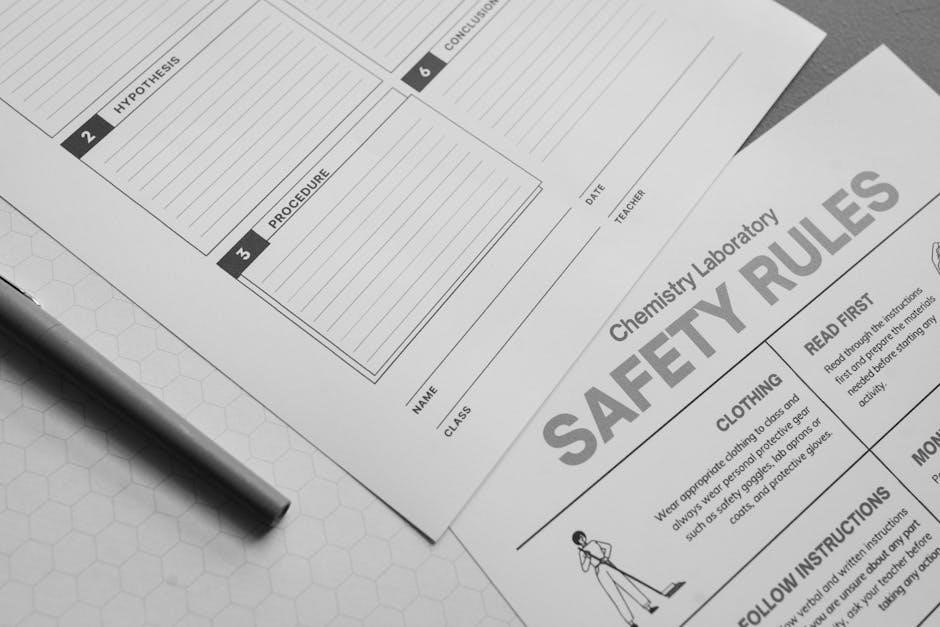The NJ-CBT-1065 is a Corporation Business Tax return for partnerships in New Jersey, issued by the Department of the Treasury. It is a free, printable form used to calculate taxes for nonresident partners. The form is essential for partnerships subject to the CBT and provides detailed instructions for accurate filing. It can be downloaded from the New Jersey Division of Revenue website.
1.1 Overview of NJ-CBT-1065
The NJ-CBT-1065 is a Corporation Business Tax return form issued by the New Jersey Department of the Treasury. It is specifically designed for partnerships required to calculate taxes on behalf of nonresident partners. This form is distinct from the Gross Income Tax (GIT) return, ensuring clarity in tax obligations for different types of income. The NJ-CBT-1065 is available for free download from the New Jersey Division of Revenue website and can be pre-filled with partnership information such as name and address. Taxpayers can access detailed instructions and examples to guide accurate completion and submission. The form is essential for partnerships subject to the Corporation Business Tax, providing a structured way to report and pay taxes on partnership income allocated to nonresident partners.

Eligibility Criteria
Partnerships subject to the Corporation Business Tax must file NJ-CBT-1065 if they derive income from New Jersey sources or have nonresident partners. Exemptions apply to tax-exempt entities.
2.1 Who Needs to File NJ-CBT-1065
Partnerships and limited liability companies (LLCs) taxed as partnerships must file NJ-CBT-1065 if they have income derived from New Jersey sources or have partners who are New Jersey residents. This includes businesses operating within the state or generating income from New Jersey-based activities. Even if the partnership does not have income directly from New Jersey, the presence of a nonresident partner with a New Jersey address may still require filing. Additionally, partnerships with nexus in New Jersey, such as maintaining a physical presence or conducting business operations within the state, are obligated to file. The form ensures compliance with state tax regulations and accurate reporting of partnership income. Filing is mandatory to avoid penalties and ensure proper tax administration. All eligible entities must submit the form annually, adhering to specified deadlines and requirements.
2.2 Exemptions from Filing
Certain entities may be exempt from filing NJ-CBT-1065 under specific conditions. Partnerships or LLCs taxed as partnerships are not required to file if they have no income derived from New Jersey sources and no partners who are New Jersey residents. Additionally, single-member LLCs treated as sole proprietorships for federal tax purposes are generally exempt, as the income is reported on the individual’s tax return. Tax-exempt organizations under federal law may also qualify for exemption if their activities do not generate unrelated business income subject to state taxation. However, even if exempt from filing, the partnership must still ensure compliance with all other state tax obligations. Always verify eligibility for exemptions to avoid potential penalties. The New Jersey Division of Taxation provides detailed guidelines to help determine filing requirements and exemptions.

Filing Requirements
Filing requirements for NJ-CBT-1065 include adhering to deadlines, selecting appropriate filing methods, and ensuring accurate payment of fees. Compliance with these steps ensures proper submission and avoids penalties.
3.1 Filing Deadlines
The filing deadlines for NJ-CBT-1065 are critical to ensure compliance. For calendar year partnerships, the return must be filed by April 15th. If the due date falls on a weekend or holiday, the deadline is the next business day. Partnerships operating on a fiscal year must file by the 15th day of the 4th month following the close of their tax year. An automatic 6-month extension can be requested using Form CBT-206, but this only extends the filing deadline, not the payment due date. Late filings may result in penalties and interest, so it is essential to mark these dates accurately. The New Jersey Division of Revenue and Enterprise Services (NJ DOR) enforces these deadlines strictly, and missing them can lead to additional charges. Always verify the deadlines and plan accordingly to avoid any delays or penalties.
3.2 Methods of Filing
The NJ-CBT-1065 can be filed using two primary methods: electronic filing and paper filing. Electronic filing is the preferred and most efficient method, as it reduces errors and ensures faster processing. Partnerships can use the New Jersey Division of Revenue and Enterprise Services’ (NJ DOR) online portal or authorized tax software to submit the return electronically. Paper filing is available for partnerships that meet specific criteria, such as those with no federal income tax filing requirement. Forms must be completed accurately and mailed to the address listed in the instructions. Always ensure the correct mailing address and include all required schedules and documentation. The NJ DOR encourages electronic filing for its speed and accuracy, but both methods are accepted as long as all requirements are met. Choose the method that best suits your partnership’s needs for timely and compliant filing.
3.3 Filing Fees and Payments
When filing the NJ-CBT-1065, partnerships must ensure timely payment of any owed taxes. The New Jersey Division of Revenue and Enterprise Services (NJ DOR) accepts payments through electronic check (e-check) or credit card. Payments can also be made by mailing a check with a paper return. For electronic payments, use the NJ DOR’s online portal, which provides immediate confirmation. If paying by check, ensure it is made payable to the “Treasurer, State of New Jersey” and include the partnership’s ID number on the check. Late payments may result in penalties and interest. Partnerships with unpaid balances can set up a payment plan through the NJ DOR. Always verify payment methods and deadlines to avoid delays or additional fees. Timely payment ensures compliance and avoids unnecessary penalties. For more details, refer to the NJ DOR website or consult the instructions provided with the form.

Step-by-Step Filing Instructions
This section provides a comprehensive guide to filing the NJ-CBT-1065 form accurately. It outlines essential steps, from gathering necessary documents to submitting the return, ensuring compliance and avoiding delays. Follow each step carefully to ensure proper filing and adherence to state regulations. Accuracy in data entry and timely submission are crucial for a seamless process.
4.1 Preparing for Filing
Preparing for filing the NJ-CBT-1065 requires gathering all necessary documents and information. This includes the partnership’s federal tax return, Schedule K-1 for each partner, profit and loss statements, and any relevant tax credits or deductions. Review the official guidelines to ensure compliance with current tax laws and regulations. Organize financial records, including income statements and expense reports, to accurately report the partnership’s income and deductions. Verify the accuracy of partner information, such as ownership percentages and addresses. Ensure all calculations are up to date and align with New Jersey tax requirements. Proper preparation prevents errors and delays in the filing process. Additionally, check for any recent changes in tax laws or business structure that may affect the filing. This step ensures a smooth and efficient submission of the NJ-CBT-1065 form.
4.2 Entering Data Accurately
Accurate data entry is crucial when completing the NJ-CBT-1065 form. Ensure all information matches the partnership’s financial records and federal tax return. Carefully input figures for income, deductions, and credits, verifying calculations to avoid discrepancies. Use precise details for partner information, such as ownership percentages and addresses, to maintain accuracy. Double-check entries for consistency across all sections to prevent errors. Utilize tax software to streamline data entry and minimize mistakes. Review each field to confirm completeness and correctness. Pay attention to specific instructions for each section to ensure compliance with New Jersey tax regulations. Correct any discrepancies before final submission to avoid delays or penalties. Accurate data entry ensures a smooth filing process and compliance with state tax requirements. This step is essential for maintaining the integrity of the partnership’s tax return.
4.3 Calculating Taxes
Calculating taxes for the NJ-CBT-1065 form involves several key steps to ensure accuracy and compliance. Begin by determining the partnership’s total income according to New Jersey state guidelines, which may differ from federal rules. Next, apply the appropriate tax rates based on the type of income or business activity. Be sure to account for any state-specific deductions or credits that can reduce the tax liability. Use tax software to automate calculations and minimize errors. Always verify the accuracy of computations by cross-referencing with financial statements and federal tax returns. Ensure all figures are precise and align with the data entered in the form. Double-check each calculation to avoid discrepancies and potential penalties. Finally, review and confirm the total tax liability before submitting the return. Accurate tax calculation is essential for a smooth and compliant filing process.
4.4 Submitting the Return
Submitting the NJ-CBT-1065 return is the final step in the filing process. Ensure all sections are complete and accurate before submission. The return can be filed electronically through the New Jersey Division of Taxation’s online portal, which is the preferred method for faster processing. For paper filers, print the completed form and mail it to the address listed in the instructions. Always retain a copy of the submitted return and any supporting documents for your records. If filing electronically, save the confirmation number provided upon submission as proof of filing. Payments must accompany the return if taxes are owed. Late submissions may result in penalties and interest, so ensure timely filing. Double-check the mailing address or electronic submission requirements to avoid delays. The state may reject incomplete or incorrect returns, so verify all details before submitting.

Understanding Form Sections
This section provides an overview of the NJ-CBT-1065 form, explaining its structure and purpose. It helps users navigate through partnership information, income calculations, tax credits, and signature requirements effectively.
5.1 Partnership Information Section
The Partnership Information Section of the NJ-CBT-1065 form requires detailed information about the partnership and its operations. This includes the partnership’s name, address, and Federal Identification Number (EIN). Accurate entry of the EIN is critical for proper identification and processing of the return; The section also asks for the tax year being reported, which may be a calendar year or fiscal year, depending on the partnership’s accounting method. Additionally, filers must provide the date the partnership began doing business in New Jersey and specify the primary business activity of the partnership. This section also includes fields for listing each partner’s name, address, and percentage of ownership, ensuring clarity on the distribution of income and liabilities. Failure to complete this section accurately can lead to processing delays or compliance issues.
5.2 Income Calculation Section
The Income Calculation Section of the NJ-CBT-1065 form is where partnerships report their total income and calculate taxable income. This section requires detailed breakdowns of various income sources, including business income, rents, royalties, and gains from sales. Each type of income must be reported separately to ensure accurate tax calculations. The form also includes specific lines for federal taxable income and adjustments to align with New Jersey tax regulations. Partnerships must list each partner’s share of income, ensuring compliance with state-specific rules. Failure to accurately report income sources can lead to errors in tax liability calculations. It is essential to carefully review all entries in this section to avoid delays or penalties. Proper documentation and adherence to guidelines are critical for a smooth filing process.
5.3 Tax Credits Section
The Tax Credits Section of the NJ-CBT-1065 form allows partnerships to claim applicable tax credits to reduce their tax liability. This section requires detailed reporting of credits, such as the Business Employment Incentive Program (BEIP) credit and Brownfields Tax Credits. Partnerships must list each credit separately and provide supporting documentation. The form includes specific lines for total credits available and credits applied, ensuring accurate calculation of the net tax due. It is crucial to verify eligibility for each credit and adhere to New Jersey’s specific requirements. Incorrect or ineligible claims can result in delays or penalties. Partnerships should carefully review this section to ensure all eligible credits are claimed and properly documented. Accurate completion of this section is essential for minimizing tax obligations and maintaining compliance with state tax laws.
5.4 Signatures and Authorization
The Signatures and Authorization section of the NJ-CBT-1065 form ensures the return is properly validated by authorized individuals. A partnership must have the form signed by a general partner, member, or corporate officer authorized to act on its behalf. The signer must provide their name, title, and the date of signing. Additionally, paid preparers or tax professionals must include their name, PTIN (Preparer Tax Identification Number), and the firm’s EIN (Employer Identification Number). This section confirms the accuracy of the information reported and authorizes the submission of the return. The IRS requires this step to maintain accountability and verify the legitimacy of the filing. Failure to include valid signatures can result in processing delays or rejection of the return. Ensure all signatures and preparer details are accurate and complete to avoid issues with the filing process.

Additional Forms and Schedules
Additional forms and schedules may be required when filing NJ-CBT-1065, such as Schedule T, Schedule NJ-K-1, and Form CBT-206, to provide detailed tax information.

6.1 Schedule T: Total Tax Paid
Schedule T is used to report the total tax paid by the partnership or LLC. It summarizes the entity’s tax liability, including any credits applied. Businesses must detail total tax, credits, and net tax due. Accuracy is crucial to avoid penalties and ensure compliance with New Jersey tax laws. This schedule helps verify that all tax obligations are met.
6.2 Schedule NJ-K-1: Partner’s Share

Schedule NJ-K-1 is used to report each partner’s share of the partnership’s income, deductions, and credits. It details the distribution of profits and losses among partners, ensuring accurate tax reporting; The schedule requires information such as each partner’s name, address, tax identification number, and their percentage of ownership. It also outlines specific allocations, like guaranteed payments and credits. This form ensures that each partner receives their correct share of the business’s tax obligations. Accurate completion is essential for compliance with New Jersey tax laws. Partners use this information to report their share on their personal tax returns, ensuring proper allocation of income and deductions.
6.3 Form CBT-206: Extension Request
Form CBT-206 is used to request an extension of time to file the NJ-CBT-1065 return. Businesses requiring additional time to prepare and submit their partnership tax return can file this form. The standard filing deadline is typically April 15th for partnerships. The extension provides an extra six months, aligning with federal extension timelines. To avoid penalties, estimated taxes must be paid by the original deadline. The form can be submitted electronically or by mail, depending on New Jersey’s current requirements. Ensure all partnership details are accurate, and the form is properly signed. Consulting official guidelines or seeking professional help is advisable for complex situations. Timely filing Form CBT-206 helps maintain compliance and avoid unnecessary penalties.

Tips for Accurate Filing
Review instructions carefully, verify numerical data, and ensure all schedules are complete. Organize documents beforehand and use tax software for accuracy. Double-check calculations and consult professionals if needed. Submit timely to avoid penalties.
- Review instructions thoroughly for clarity.
- Verify numerical data for accuracy.
- Ensure all schedules and forms are complete.
- Organize documents before starting the process.
- Use tax software to minimize errors.
- Double-check calculations and entries.
- Consult a tax professional for complex cases.
- Submit the return well before deadlines.
7.1 Avoiding Common Mistakes
Avoiding common mistakes ensures accurate and timely filing of NJ-CBT-1065. Errors often occur in partner information, income reporting, and tax calculations. Always verify partner details, including percentages of ownership and addresses. Ensure income and deductions are correctly categorized and totaled. Double-check tax credit calculations to avoid overclaims. Missed deadlines and incomplete schedules are frequent issues, so review all attachments carefully. Additionally, ensure the return is properly signed and authorized. Lastly, be cautious with rounding numbers, as minor discrepancies can trigger audits. By addressing these areas, filers can minimize errors and ensure compliance with state requirements.
- Verify partner details, including ownership percentages and addresses.
- Ensure accurate categorization of income and deductions.
- Double-check tax credit calculations to prevent overclaims.
- Review all schedules and attachments for completeness.
- Ensure the return is properly signed and authorized.
- Avoid rounding errors that could lead to discrepancies.
7.2 Best Practices for Compliance
Best practices for compliance with NJ-CBT-1065 involve maintaining accurate records, utilizing updated tax software, and ensuring timely filing. Staying informed about tax law changes and seeking professional assistance when needed can prevent errors. Conducting regular internal reviews helps in identifying discrepancies early. By adhering to these practices, partnerships can ensure their returns are compliant with state regulations.
- Maintain accurate and detailed records for all financial transactions.
- Use tax preparation software updated with the latest forms and instructions.
- File the return well before the deadline to avoid last-minute issues.
- Seek professional help for complex sections or unclear requirements.
- Review and update records regularly to reflect changes in the business or tax laws.
- Implement internal checks to ensure accuracy and completeness.

Resources and Support
The New Jersey Division of Taxation offers official guidelines, publications, and professional assistance to help with NJ-CBT-1065 filing. Additional support includes online resources, a taxpayer helpline, and community forums.
8.1 Official Guidelines and Publications
The New Jersey Division of Taxation provides official guidelines and publications to assist with NJ-CBT-1065 filing. These resources include detailed instructional guides, tax bulletins, and updated forms. The official website offers a comprehensive manual specifically for NJ-CBT-1065, explaining eligibility criteria, filing requirements, and tax calculation methods. Additionally, the division publishes annual updates reflecting changes in tax laws. Taxpayers can access downloadable PDF versions of the form and instructions, as well as interactive tools for easier navigation. The guidelines also include examples and sample forms to clarify complex sections, ensuring accurate completion. For further clarification, the division provides contact information for inquiries and support. These official resources are essential for understanding and complying with the filing process.
8.2 Seeking Professional Assistance
For complex situations or to ensure compliance, seeking professional assistance is highly recommended. Certified public accountants (CPAs) or tax attorneys specializing in New Jersey corporate business tax can provide expert guidance. They can help navigate intricate calculations, ensure accurate data entry, and address specific scenarios, such as multi-state income allocations or apportionment. Professionals can also assist with resolving disputes or audits, offering legal interpretations and strategies. Additionally, tax preparation firms often provide NJ-CBT-1065 filing services, leveraging their expertise to streamline the process. Taxpayers can find qualified professionals through certifications like the American Institute of Certified Public Accountants (AICPA) or local bar associations; Consulting a professional ensures adherence to regulations and minimizes the risk of errors or penalties. It is especially beneficial for large partnerships or businesses with complex tax situations.
Filing the NJ-CBT-1065 form requires careful preparation and attention to detail to ensure compliance with New Jersey state tax regulations. By understanding the eligibility criteria, filing requirements, and step-by-step instructions, partnerships can accurately complete and submit their returns. Utilizing resources such as official guidelines, tax software, and professional assistance can significantly simplify the process. It is crucial to avoid common mistakes and adhere to deadlines to prevent penalties. Staying informed about updates to tax laws and regulations is also essential for maintaining compliance. By following the outlined steps and best practices, partnerships can efficiently navigate the NJ-CBT-1065 filing process and ensure accurate reporting of their business income and taxes. Proper preparation and awareness of available resources can make the experience seamless and stress-free.



